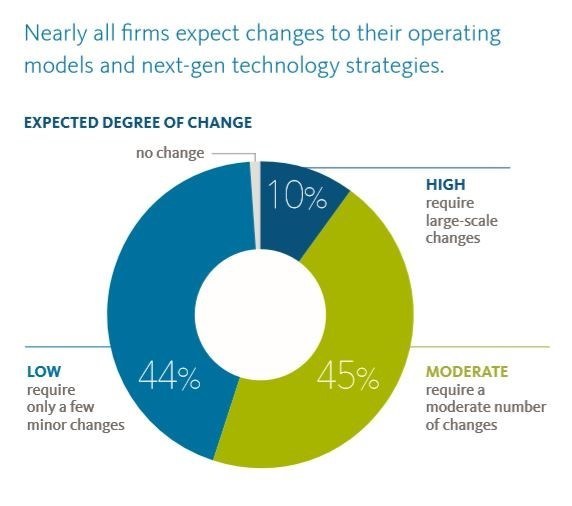Financial Services Firms Accelerating Technology Transformation to Navigate the Pandemic, New Broadridge Study Finds
38% of financial services executives expect the business recovery from COVID-19 to take one- to -two years
More than half of financial services companies plan to accelerate implementation of their next-generation technology strategies, according to a new global survey of 500 financial services C-Suite executives and their direct reports released by Broadridge Financial Solutions, Inc., a global fintech leader.

“Financial services players have shown they can adapt and change during the pandemic. Going forward, they will continue to drive digitization and mutualization to improve client experience, resiliency, and cost,” said Tim Gokey, CEO of Broadridge. “Prior investments in digital, cloud, and mutualized technologies have enabled companies to be more resilient during the crisis, and executives are taking careful note as they plan for the future.”
Recommended AI News: Arca Offers The First SEC-Registered Fund Issuing Digital Securities
Virtually all financial services companies expect the pandemic to affect their operating model and strategy toward next-generation technology. In the next six months, companies plan to focus on:
- Increasing cybersecurity and risk management (63%)
- Enhancing multi-channel client communications (60%)
- Improving customer engagement and experience (53%)
- Making significant cost reductions (45%)
Prior investments that were most beneficial in managing the pandemic were interactive digital technologies (72%) – defined as digitizing customer and employee experiences, workflows and operations along with cloud technologies (59%).
As a result of the pandemic, many firms have reprioritized their investment strategies. Businesses may never return to the old “normal”, leaving firms little choice but to accelerate their digital transformation.
- 58% plan to increase investment in interactive digital technologies
- 54% plan to increase investment in artificial intelligence (AI)
- 49% plan to improve their ability to quickly gather and analyze data moving forward
Recommended AI News: Deloitte And Nuvolo Announce New Alliance For Modern Connected Workplace, Built On ServiceNow
The pandemic has also changed the role of fintech service providers, with 70% of respondents stating that fintech providers’ ability to offer innovative uses of next-generation technology is now more important as a result of the outbreak. Almost half of respondents agree that the pandemic increased the need to mutualize – in other words, share or outsource – processing functions to reduce costs and increase resiliency.
- Commercial and investment banks and broker-dealers agree most strongly (54% and 49%, respectively)
- Sell-side companies believe this more strongly than buy-side companies (49% and 42%, respectively)
- Hedge funds were least likely to agree (36%)
Leveraging next-gen technologies is part of Broadridge’s investment in The ABCDs of Innovation® – AI, blockchain, the Cloud and digital – helping clients understand and apply these technologies by simplifying the complex to help them be Ready for Next. To see the full Broadridge Next-gen Technology Pulse survey report click here.
Methodology
This Broadridge survey was conducted by ESI ThoughtLab to assess the adoption of next generation technologies. C-Suite executives and their direct reports from 500 financial institutions globally were surveyed, with fielding completed June 1, 2020. The survey was administered to executives from buy-side and sell-side firms, including universal banks (20%), commercial or investment banks (16%), broker-dealers (14%), investment/asset managers (15%), insurance companies (13%), hedge funds (11%) and wealth managers (11%). Responses were split evenly among the APAC, EMEA and North American regions. For further details on survey methodology, please contact a Broadridge media representative.
Recommended AI News: How Precise Location Based Advertising Is The Future Of Mobile Marketing

Comments are closed, but trackbacks and pingbacks are open.